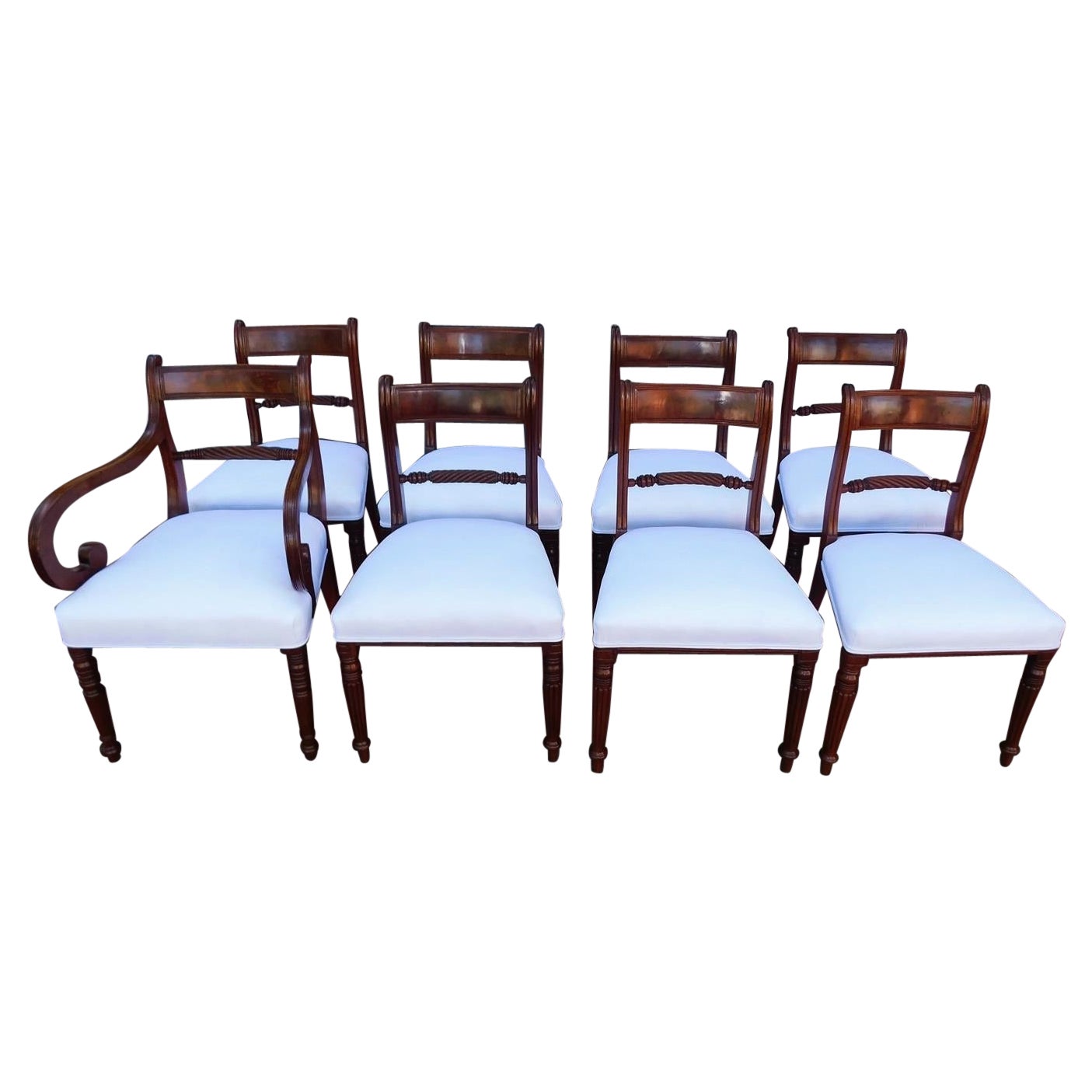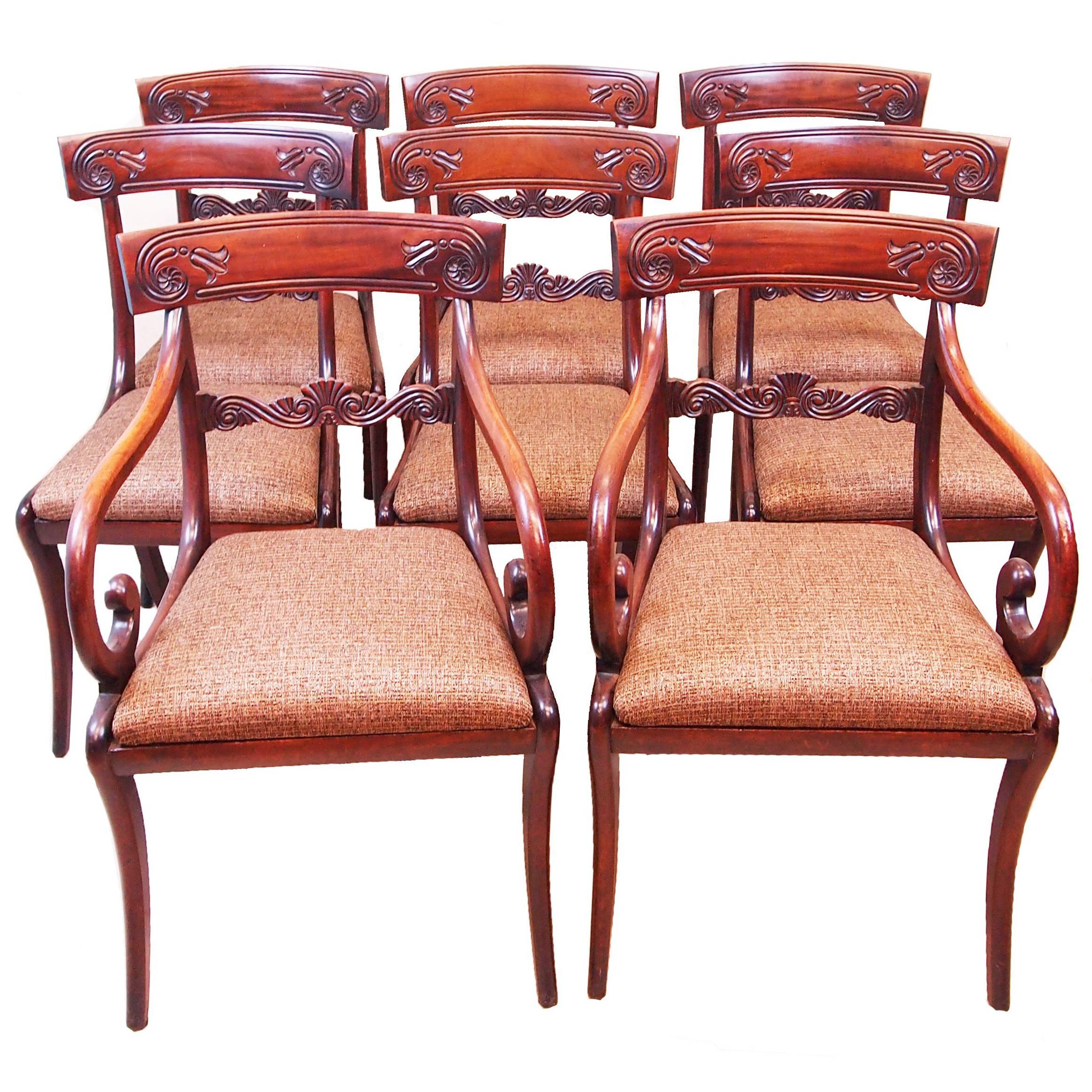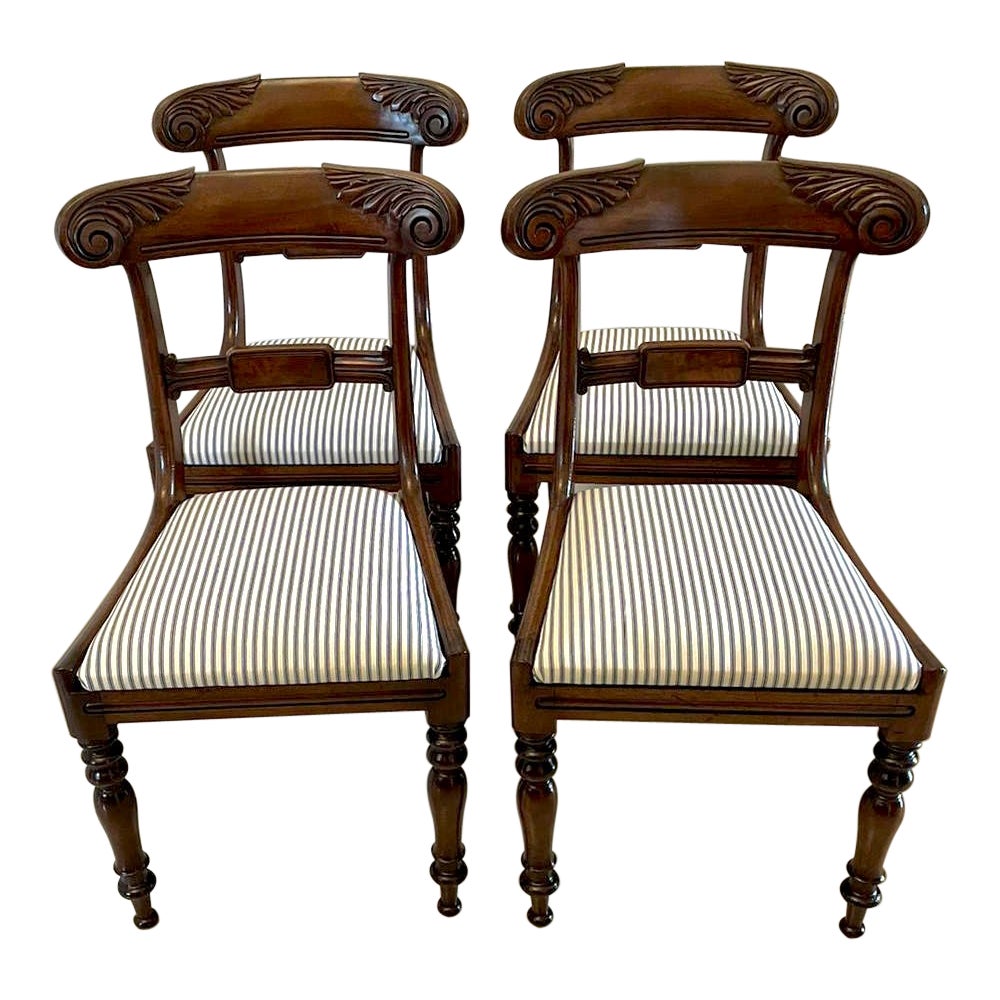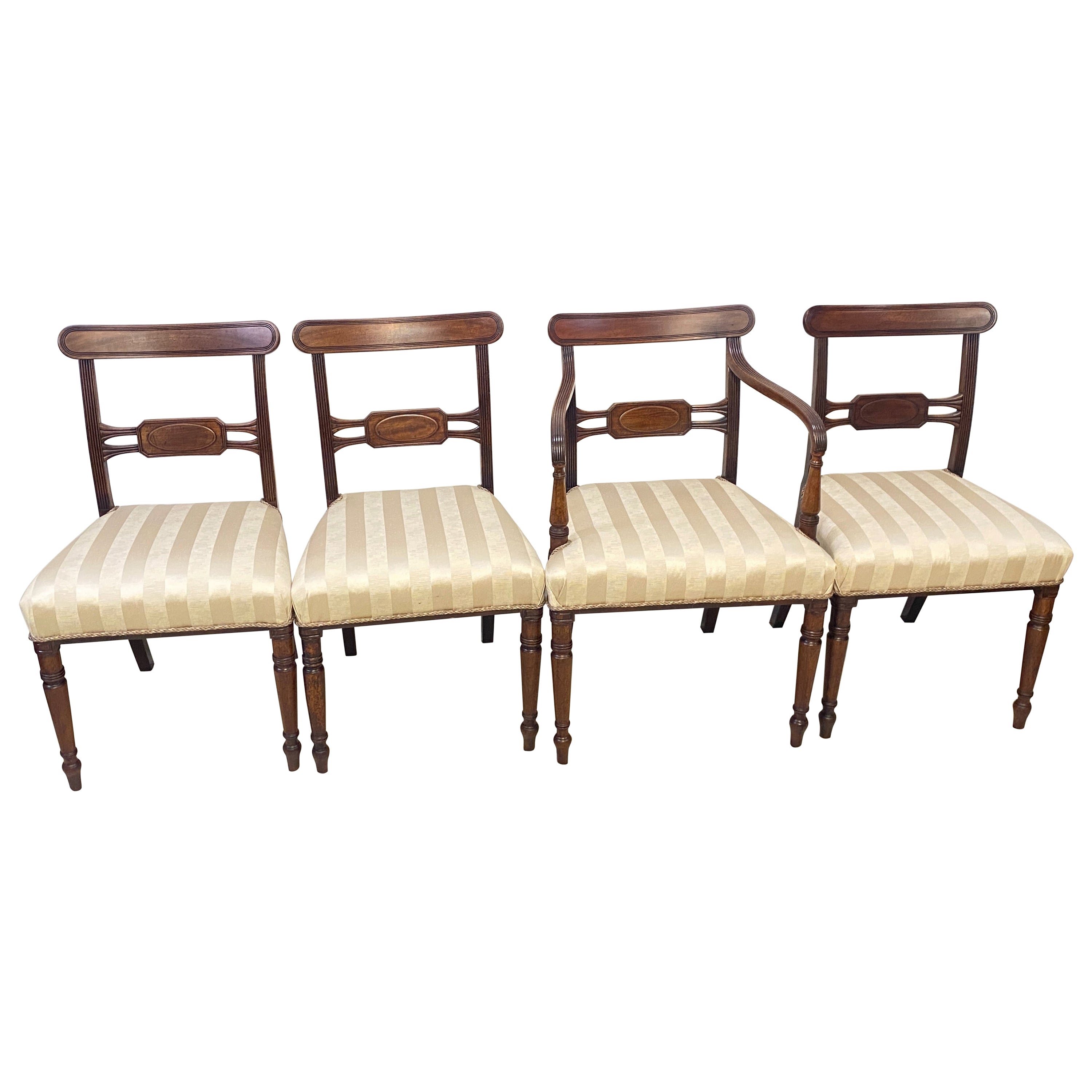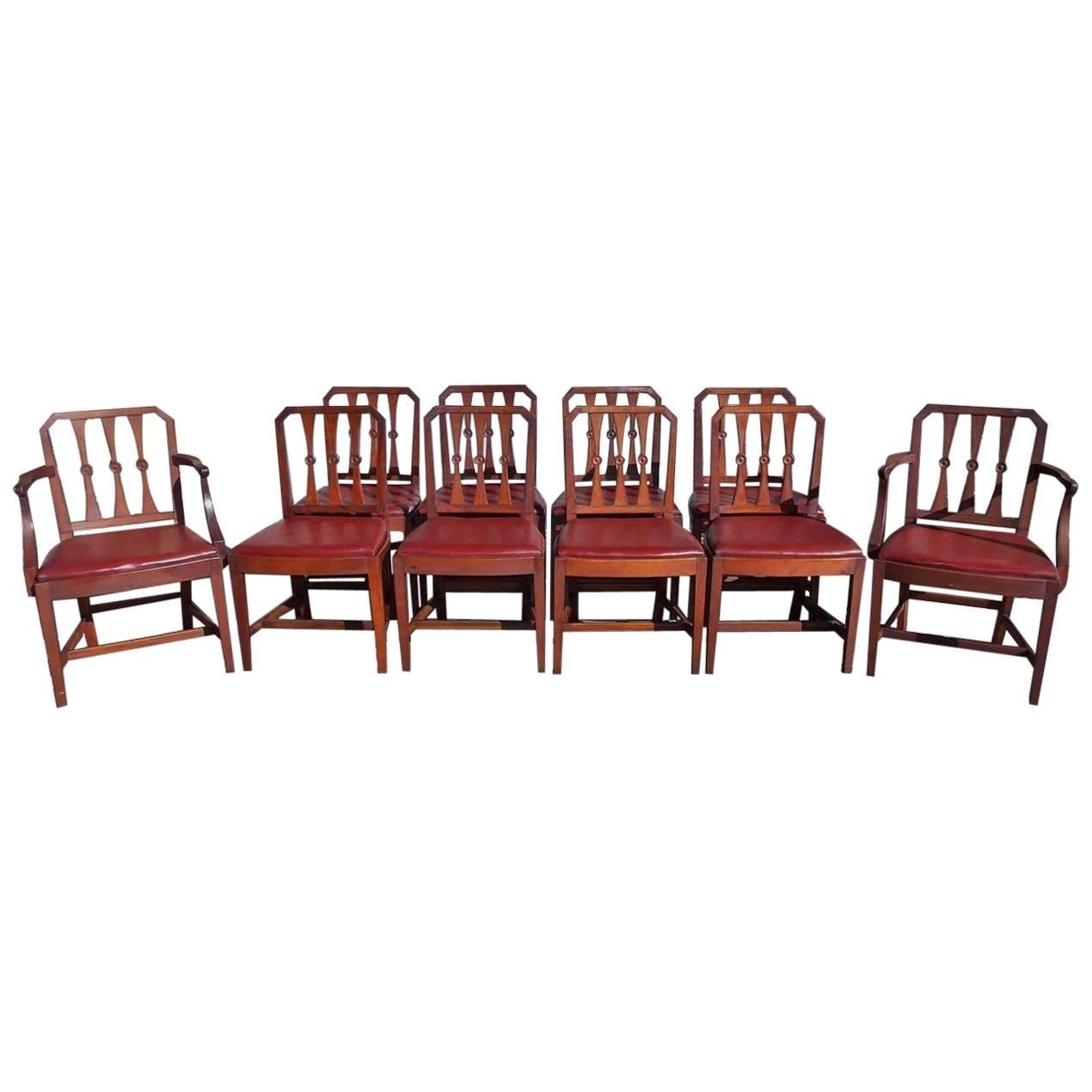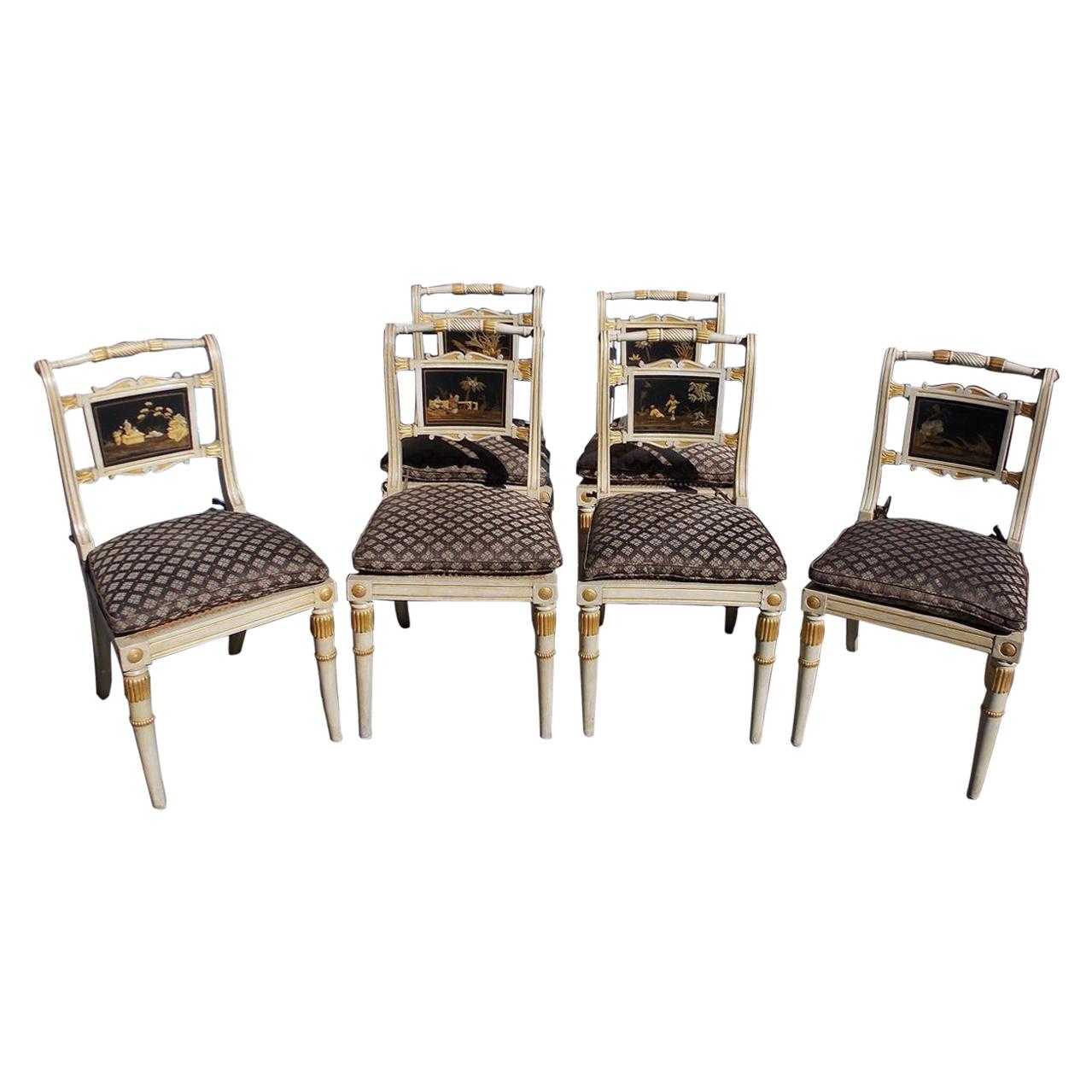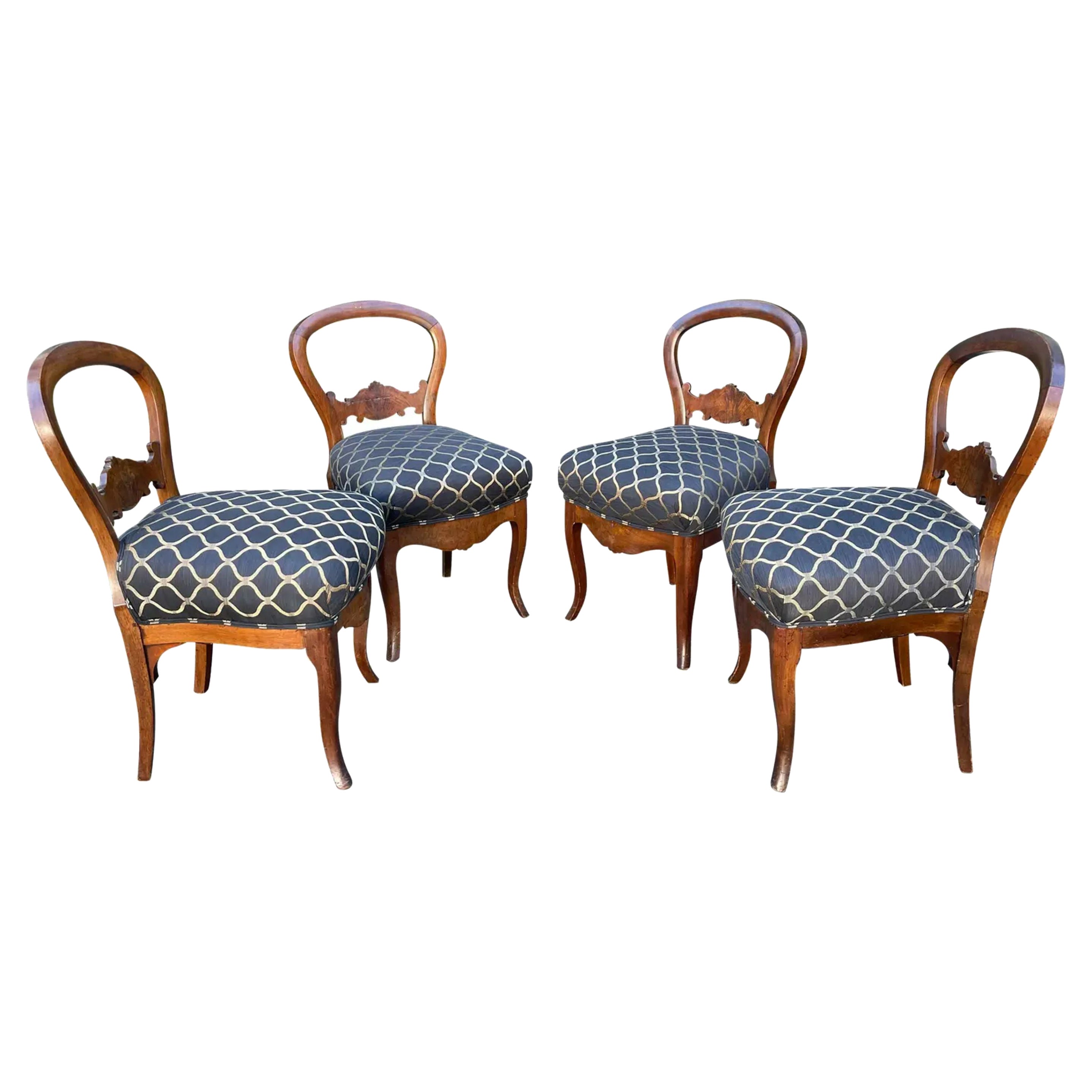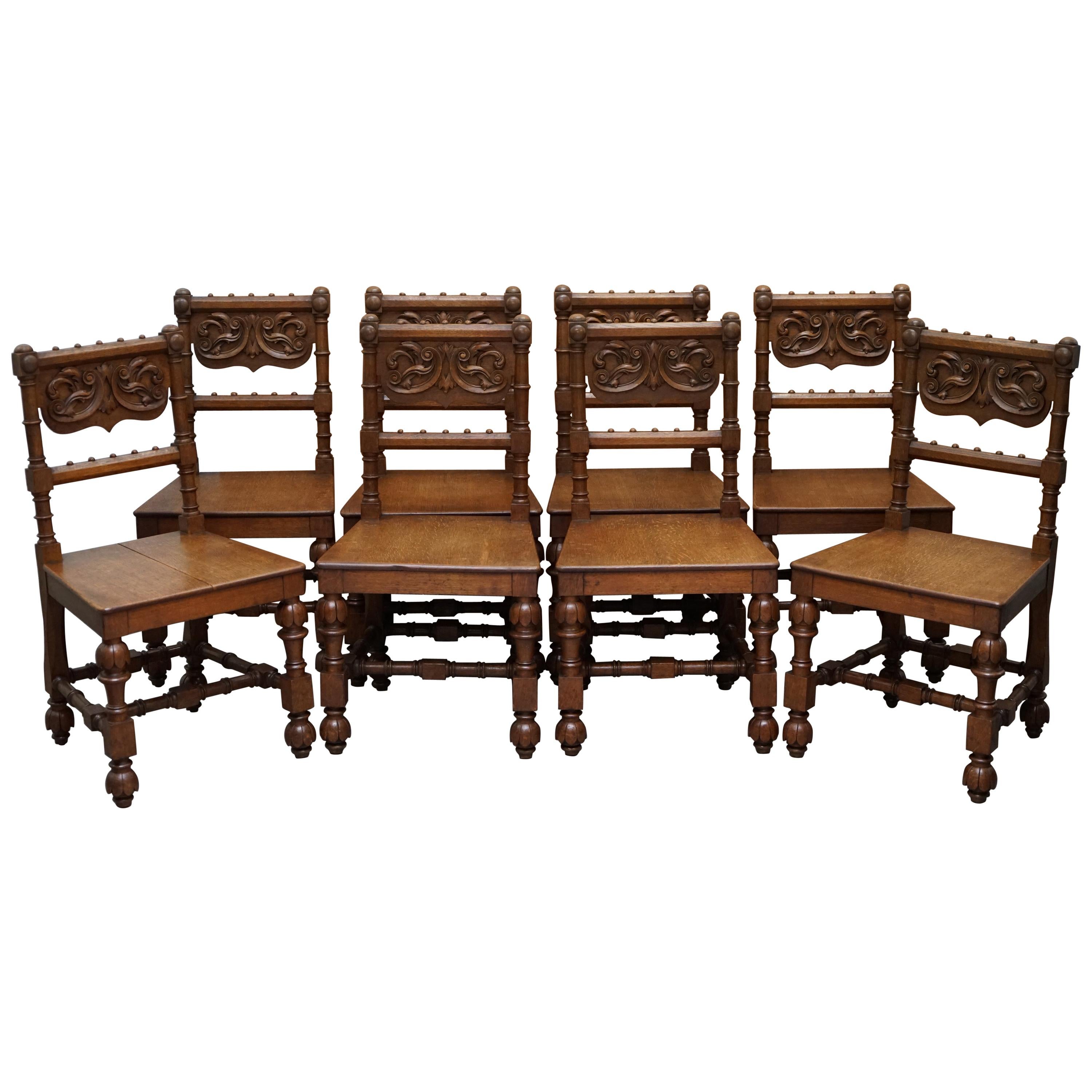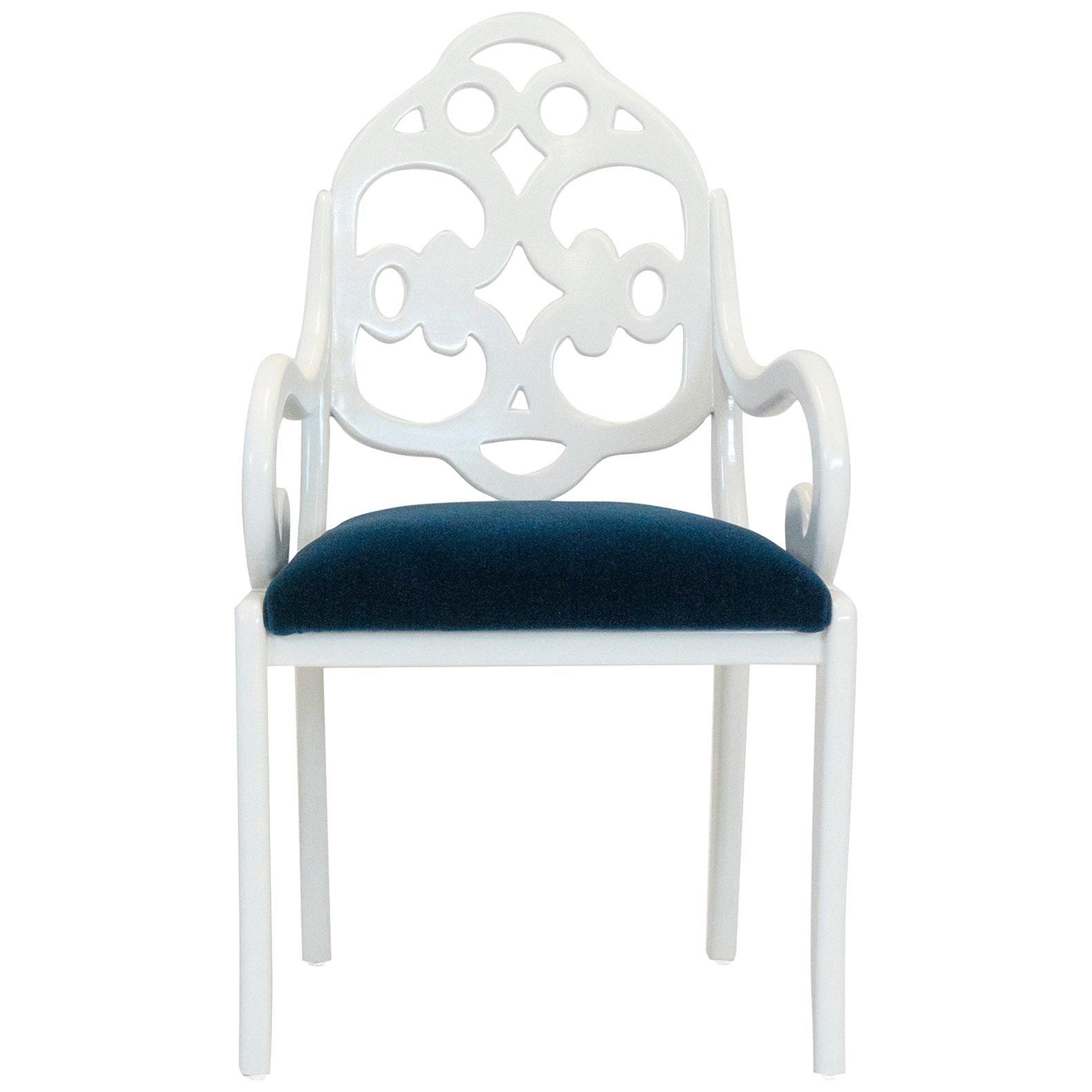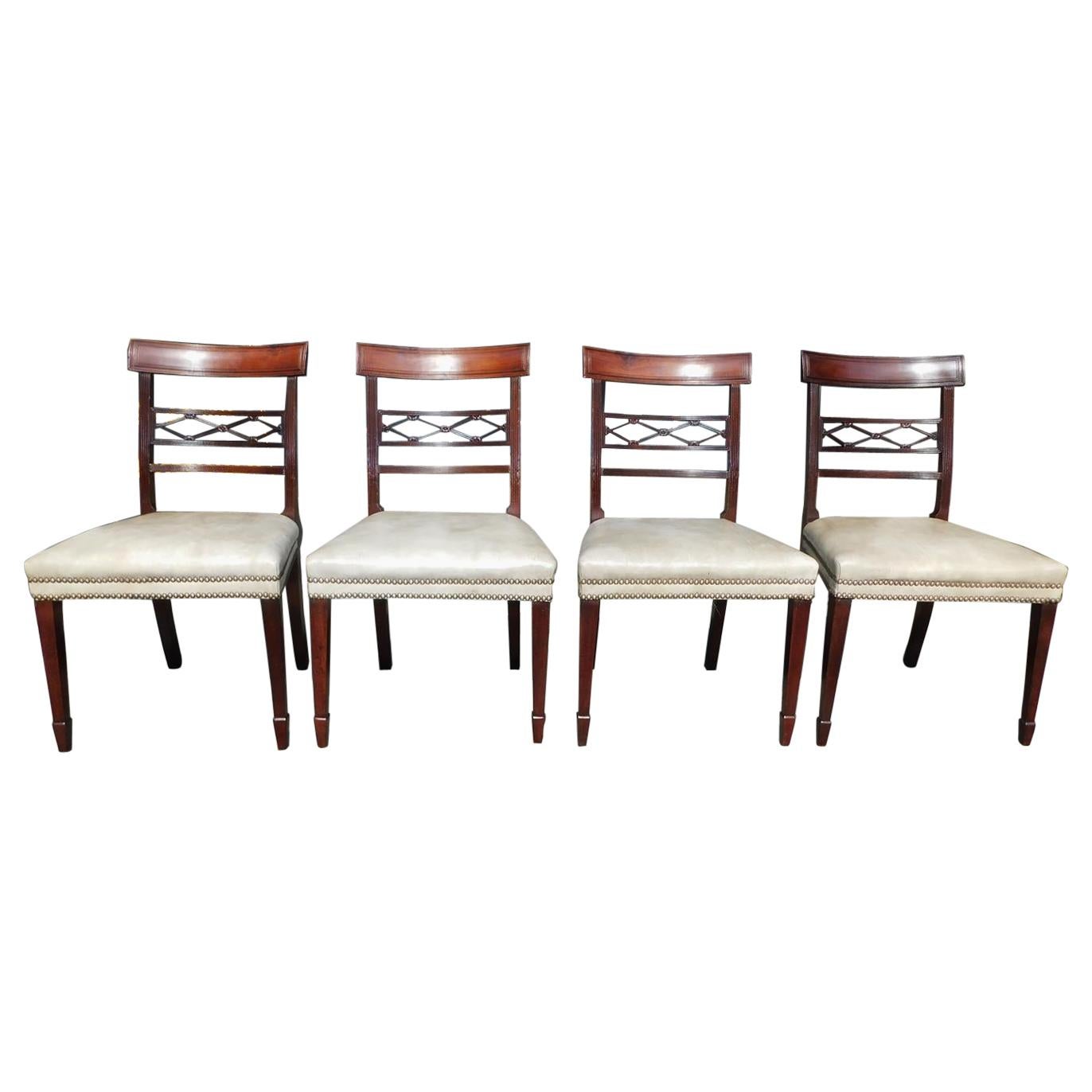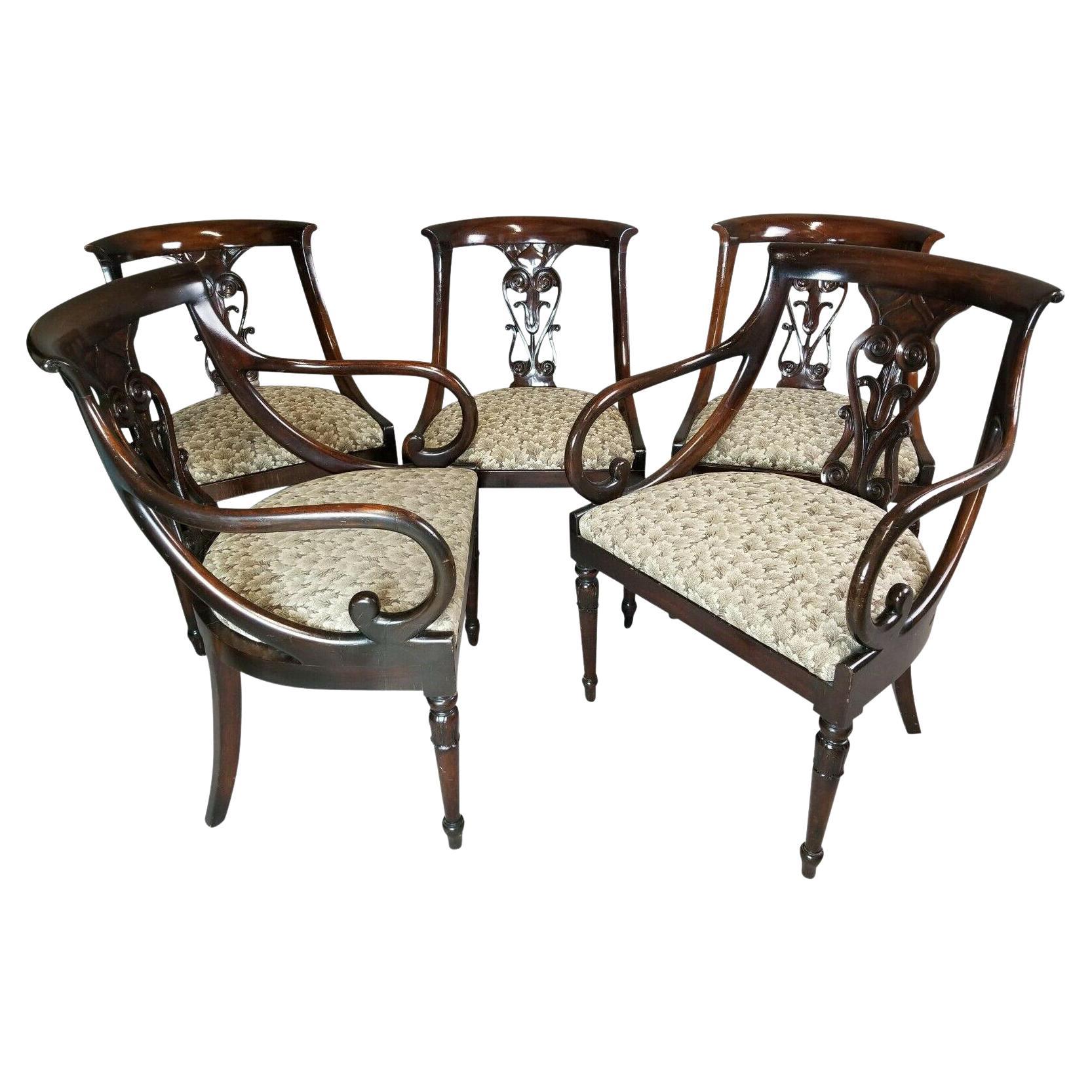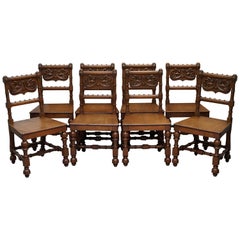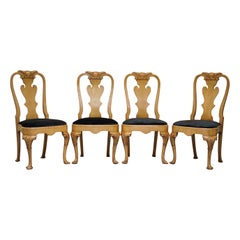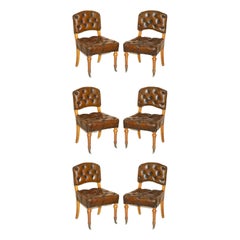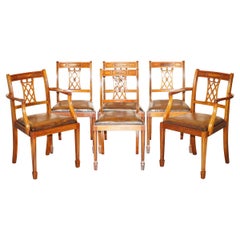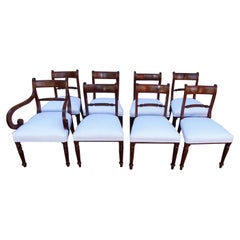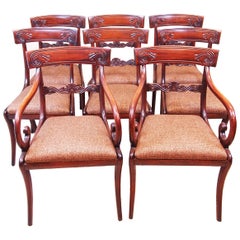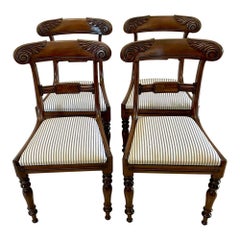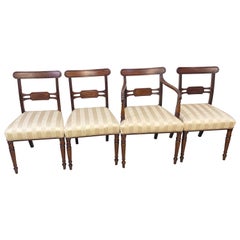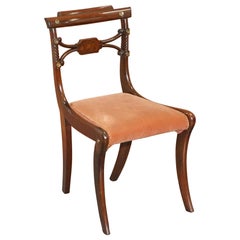
Stunning circa 1810 Regency Flamed Mahogany Dining Chair Ornately Carved Frame
View Similar Items
Want more images or videos?
Request additional images or videos from the seller
1 of 19
Stunning circa 1810 Regency Flamed Mahogany Dining Chair Ornately Carved Frame
$482.24List Price
About the Item
- Dimensions:Height: 31.89 in (81 cm)Width: 18.51 in (47 cm)Depth: 20.08 in (51 cm)Seat Height: 17.33 in (44 cm)
- Style:Regency (Of the Period)
- Materials and Techniques:
- Place of Origin:
- Period:
- Date of Manufacture:1810-1820
- Condition:Wear consistent with age and use. Minor losses. Minor structural damages. Minor fading.
- Seller Location:West Sussex, GB
- Reference Number:1stDibs: LU2823320788992
About the Seller
4.7
Platinum Seller
Premium sellers with a 4.7+ rating and 24-hour response times
Established in 2012
1stDibs seller since 2017
2,017 sales on 1stDibs
Authenticity Guarantee
In the unlikely event there’s an issue with an item’s authenticity, contact us within 1 year for a full refund. DetailsMoney-Back Guarantee
If your item is not as described, is damaged in transit, or does not arrive, contact us within 7 days for a full refund. Details24-Hour Cancellation
You have a 24-hour grace period in which to reconsider your purchase, with no questions asked.Vetted Professional Sellers
Our world-class sellers must adhere to strict standards for service and quality, maintaining the integrity of our listings.Price-Match Guarantee
If you find that a seller listed the same item for a lower price elsewhere, we’ll match it.Trusted Global Delivery
Our best-in-class carrier network provides specialized shipping options worldwide, including custom delivery.More From This Seller
View AllEight Hand Carved Walnut Gothic Revival Dining Chairs circa 1840 Stunning Frames
Located in West Sussex, Pulborough
We are delighted to this lovely suite of eight Gothic Revival hand carved walnut dining chairs
A very good looking and well made suite, made in circa 1840 but based on a much earl...
Category
Antique 1840s English Gothic Revival Dining Room Chairs
Materials
Walnut
$4,340 Sale Price / set
30% Off
Stunning Set of Four Walnut Queen Anne Dining Chairs Acanthus Leaf Carved Wood
Located in West Sussex, Pulborough
We are delighted to offer for sale this stunning set of four circa 1900 walnut Queen Anne dining chairs with black crushed velvet velour upholstery
A very good looking and decorat...
Category
Antique Early 1900s English Queen Anne Dining Room Chairs
Materials
Walnut
$1,446 Sale Price / item
30% Off
Six Important Antique Regency Leather Pollard Oak Chesterfield Dining Chairs
By Chesterfield
Located in West Sussex, Pulborough
We are delighted to offer for sale this very rare suite of fully restored Regency Chesterfield brown leather dining chairs wit...
Category
Antique 1820s English Regency Dining Room Chairs
Materials
Leather, Oak
$11,573 Sale Price / set
30% Off
Six Vintage Restored Hand Dyed Brown Leather Hand Carved Frame Dining Chairs
By George Hepplewhite
Located in West Sussex, Pulborough
Royal House Antiques
Royal House Antiques is delighted to offer for sale this lovely suite of six fully restored George Hepplewhite style dining chairs.
Please note the deliver...
Category
Mid-20th Century English Art Deco Dining Room Chairs
Materials
Leather, Beech
$4,081 Sale Price / set
25% Off
circa 1845 C Hindley & Sons Lion Carved Chesterfield Brown Leather Dining Chairs
By Charles Hindley & Sons, Chesterfield
Located in West Sussex, Pulborough
We are delighted to offer this very rare and important suite of five fully restored C Hindley & Son’s dining chairs circa 1844-1845
These are a very important and substantial set of chairs, they have been fully restored to include being stripped back to the bare frames, all the timber has been washed back and French polished , they have then been resprung using the original period coil sprung bases, new webbing fitted, then upholstered with premium Italian cattle grade fully aniline plain natural leather which has been individually hand nail tacked in place using antiqued studs, lastly hand dyed six times and antiqued to give it this one off cigar brown colour.
These chairs have been on a journey as mentioned and they are true investment pieces, ready to serve the new owner for decades to come. Usually, I wouldn’t take dining chairs through such an expensive process however the carving to the legs is so sublime they warranted the treatment, I have never seen such beautiful Lion’s mains and terminating with hairy paws with recessed castors, these are simply put the finest dining chairs on the market anywhere in the world today you can buy.
Dimensions
Height:- 94.5cm
Width:- 57cm
Depth:- 74cm
Seat height:- 50cm
ABOUT THE CABINET MAKERS
Hindley, Charles & Sons Berners Street & Oxford Street, London; cabinet makers, upholsterers and retailers (fl.c.1820-1892)
Charles Hugh Hindley (b.1792- d.1871) was the son of Christopher, a merchant in Mere, Wiltshire. He moved to London with an elder brother to live with his uncle, who was possibly running the London branch of the Wiltshire business.
In 1817 Charles joined the upholstery firm of Benjamin Merriman Nias at 32 Berners Street. Within a few years he bought the Nias business with a £1,000 investment from his family. Despite his business being described as a 'carpet warehouse' in London directories from 1820-1841, by the mid-1830s upholstery and cabinet work had joined his repertoire and he had taken on more showroom space next door at 31 Berners Street.
Family records of the 1840s showed that individual custom-order business expanded to also ‘supplying established furnishing houses with goods on wholesale terms’. Jobs ranged from supplying Pentonville Prison with 100 hair mattresses and pillows, to altering spring roller blinds, to fulfilling private commissions with suites of parlour furniture.
Hindley was the father of eleven children with three involved in the business: Charles Hugh (b. 1818), Frederick (b. 1820), and Albert Daniel (b.1822). Charles Hugh and Frederick joined the family firm about 1832, thus establishing the family partnership, Charles Hindley & Sons.
Albert Daniel learned the carpet manufactory and trade in Kidderminster and eventually established a carpet manufactory in Liversedge, Yorkshire, supplying the family’s London store and others. In 1845 he patented an early tufted carpeting technique. Charles Hindley & Sons acquired the firm, Miles & Edwards in September 1844, including their premises at 134 Oxford Street. Both companies operated from this address until 1845 when Miles & Edwards was closed.
The purchase of Miles & Edwards enabled Hindley & Co. to compete with other West End firms by offering everything from cabinet making and upholstery to painted decoration and interior design for the middle and upper class market.
In a sample of 737 orders from October 1842-June 1845, six per cent of the clientele were upper and lower aristocracy with approximately seventy per cent gentry or middle class. The aristocratic clientele included the surnames of Hoare, Kirland, Drummond, Montefiore, Ashburton and Rothschild, and the Oriental Club at 18 Hanover Square (1824).
Commissions were also executed for:
Lady Fetherstonaugh at Uppark: bills dating 1852 and 1862 for furniture and curtains
C B E Wright of Bolton Hall, Yorkshire: decorative wood panels
The Earl of Dudley at Himley Hall, Staffordshire: a carved gilt wood centre table with mosaic top, dated 1845 and a bedroom suite (sold by Hampton & Sons, July 1924)
Sir Clifford Constable at Burton Constable (1849)
George Hammond Lucy at Charlecote Park: carpeting (19 December 1844)
The Duke of Cleveland at Raby Castle
The Duke of Argyll, the Duke of Newcastle
Lord and Lady Burton of Burton-on-Trent
Sir William Eden of Windlestone Hall, Durham.
Buckingham Palace: a small supply of Chintz wall covering for some rooms (1855)
Surviving marked furniture by Hindley & Co. includes a stamped Regency kidney-shaped desk, veneered in yew and panelled with boxwood and ebony inlay, ornamented with finely-chased mounts and beadings, c.1830 [Connoiseur, November 1978], which is possibly the one illustrated in Gilbert (1996), fig. 498, and a walnut writing table with a raised set of drawers, 1840s, stamped C. Hindley & Sons, illus. (Gilbert (1996), fig. 497 and sold by Sotheby’s, 5 August 1981, lot 209.
The staff at 134 Oxford Street comprised management, sales staff, designers, foreman, clerks, cabinet makers, chair makers, upholsterers, carvers, carpenters and French polishers. They also contracted tradesmen specialising in particular decorative and finishing techniques; such as Joseph Spong, a japanner, and William Stannard, a carver and gilder, who supplied significant orders, 1845-46. Stannard was also recorded in the stock book for ‘Repairing, Cleaning and Varnishing 18 Paintings [frames] £9.0.0’.
Family records describe several employees: ‘a large and very ancient carpenter named Tomlinson… a cabinetmaker named Westbrook... [and] a foreman named Sorrel’.
Charles Hindley & Sons showed a large Gothic sideboard at the Great Exhibition in 1851, inspired by Pugin (illustrated Microulis, Studies in the Decorative Arts (Spring/Summer 1998) p. 86) and they exhibited a Gothic bookcase and large sideboard at the 1862 International Exhibition, London (illustrated Microulis, Studies in the Decorative Arts (Spring/Summer 1998) p. 88). Both were elaborately carved pieces, described in the Art Journal Illustrated Catalogue as ‘evidence of sound judgment and advanced taste in the designer, and of able and skilful workmanship’. They also participated in the Building Trades Exhibition at the Agricultural Hall, Islington, 1883 [The Furniture Gazette, 7 April 1883]. They exhibited Japanese leather papers at the Manchester Fine Art & Industrial Exhibition, 1882, and were awarded a silver medal for embossed leather wall hangings at the Calcutta International Exhibition, 1883 [The Furniture Gazette, 18 November 1882 & 10 May 10 May 1884].
They also participated in the Workman’s Exhibition at Central Hall in Holborn, 1890 [The Furniture Gazette, 15 April 1890]. The designers did not sign their work but about fifteen different people were probably involved during the fifty-year period. One designer who worked in the late 1880s was J. Armstrong Stenhouse. He and the cabinet makers, G. R. Mackenzie, D. MacLennan and D. F. Lavach, as well as the carver, F. Lucas, worked on two Hindley exhibition pieces for the 2nd exhibition of the Arts and Crafts Society, London
An archive of 114 drawings (now at the Metropolitan Museum of Art) was collated by Charles Albert Hindley (1863-1947), a grandson of the founder. These designs c.1844-1883 (some illustrated in ?Microulis, Furniture History?(2001), figs 1-16.), reflected the current trends of reinterpreted styles such as Gothic and Louis, and several seated furniture designs were labelled with specific commercial names such as the ‘Victoria Chair...
Category
Antique 1840s English Early Victorian Dining Room Chairs
Materials
Leather, Hardwood
$16,533 Sale Price / set
20% Off
12 Important John Gee 1779-1824 Original Regency Hardwood & Brass Dining Chairs
By John Gee
Located in West Sussex, Pulborough
We are delighted to offer for sale this rare and important suite of twelve original John Gee 1779-1824 Regency bergère Rosewood with brass inlay dining chairs
Where to start, these are as rare as they come, an original suite of John Gee chairs and twelve no less! They have rosewood frames, brass inlaid and period bergère seats with later mate removable cushions. I have included a brief history on John Gee below along with some of is later sales and so on
Most likely if you are a collector and follower of fine furniture, you would have seen this design many times before, these are the originals, where it all began, the first edition period pieces by one of the great cabinet makers of the late 18th to early 19th century. The craftsmanship is as fine as they come
In terms of the condition, they are all structurally sound, the finish is original and they haven’t been professionally restored so far as I can see. There are some small losses which is quite normal to the brass work and some punches to the bergère again consistent with age and use, they are after all, over 200 years old. We have deep cleaned hand condition waxed and hand polished them from top to bottom, I can have them fully, professionally restored for the cost price should the new owner wish, they can be made as gallery perfect as possible
X2 Carver dimensions
Height:- 84.5cm
Width:- 52cm
Depth:- 59cm
Seat height:- 45cm
X10 standard chair dimensions
Height:- 84.5cm
Width:- 46.5cm
Depth:- 53cm
Seat height:- 46cm
Please note all measurements are taken at the widest point
Gee, John 49, Wardour Street, Soho, London; chair maker and turner (fl.1779–c.1824)
Also listed as Gee & Sons (1809) and Gee, Thomas Ayliffe (1804– 09)
In about 1779 John Gee replaced Thomas Ayliffe as partner to Benjamin Crompton, who had been Turner in Ordinary to George III since 1762. On 14 October 1787 Gee was sworn in as turner ‘jointly with Thos. Ayliffe his partner’, but his name, unlike Ayliffe's, does not appear in the Court and City Register until 1799. Ayliffe was the fourth member of his family to be a turner to the King, so Gee was probably the junior partner.
In 1790 Lord Wilton bought chairs for the Music Room at Heaton Hall, Lancs. ‘2 June 1790 Aycliffe & Gees Bill for chairs etc. £49 8s.’. From 1799, when he is described as ‘Chair-maker, 49 Wardour Street, Soho’, Gee is listed in London directories.
In 1803 he is called ‘Chairmaker & Turner to His Majesty’ and this title occurs regularly in entries up to 1823; in most directories, however, this appointment is omitted. Gee is also included in the list of master cabinet makers attached to Sheraton's Cabinet Dictionary, 1803. The last directory listing for Gee is 1823–24.
On 8 November 1804 Thomas Ayliffe Gee was appointed Turner in Ordinary to the King jointly with his father and briefly, in one directory of 1809 the firm is listed as ‘Gee & Sons, Turners & chair makers’. John Gee's name is shown in the Court and City Register until 1831, well after his apparent retirement.
Charles Holme Bridges, who succeeded Gee at 49 Wardour St in 1824 received a royal warrant in 1822 but is first entered as a turner in the 1832 Register. Gee's productions have been identified through stamped marks: ‘J GEE’, ‘GEE’, l GEE’, ‘Jn. G’ and a crown, J within G, and ‘GEE WARDOUR ST’ have been noted. Certain chairs are stamped with initials: ‘RR’, ‘GL’, ‘GH’, ‘IT’ and ‘WG’ have been noted. These are probably the marks of individual chairmakers in Gee's employ.
His seems to have been a substantial undertaking. The following summary list records chairs by Gee in the order of their emergence:
Pride's of London, 1962, 6 chairs, painted trophies on green and brown background, stamped ‘J GEE’. Bearne's Sale Rooms, 1964, settee, 2 armchairs, 7 chairs, stamped ‘J GEE’; 8 chairs, brass inlay, stamped ‘J GEE’. Sotheby's, London, 19 June 1970, lot 80, 4 chairs, simulated rosewood, gilt, stamped ‘GEE’ and ‘RR’; Sotheby's, London, 23 October 1970, lot 170, 6 chairs, simulated rosewood and brass inlay, stamped ‘GEE’ and ‘GL’ (some only); Sotheby's, London, 11 June 1971, lot 192, 2 armchairs, ebonised and gilt, stamped ‘GEE’; Christie's, London, 20 January 1972, lot 64, 8 chairs, ebonised, stamped ‘I GEE’ and ‘GH’; Bearnes & Waycotts, 1974(?), armchair, painted. Christie's, London, 31 October 1974, lot 98, 3 chairs, gilt, one branded ‘Jn. G’ twice with crown, the other two branded with crown, and with trade label of Copworth Bros. & Harrison, 22 Old Bond Street, Carpet & Cabinet Manufacturer to Her Majesty; Pride's of London, 1975, 6 chairs, simulated rosewood and brass inlay. Temple Newsam House, Leeds, 1976, 2 armchairs, ebonised and painted, stamped J within G and ‘IT’. Mrs G. M. Douglas, Bath, 1978, 3 chairs, painted green, stamped ‘GEE WARDOUR ST’ and ‘WG’. Sotheby's, London, 14 November 1979, lot 277, 2 chairs, painted with flowers, one stamped ‘GEE’. Private House, Monmouthshire, 1985, 8 chairs, ebonised, all stamped ‘GEE’ and ‘IT’, and 2 settees, en suite, both stamped ‘GEE’ and (?) ‘WP’. SOANE MUSEUM, 4 plain splat back chairs...
Category
Antique 18th Century English Regency Dining Room Chairs
Materials
Rattan, Rosewood
$38,578 Sale Price / set
30% Off
You May Also Like
English Regency Set of Eight Mahogany Dining Room Chairs W/ Reeded Legs C. 1810
Located in Charleston, SC
English Regency set of eight mahogany dining room chairs with scrolled crest rails and arms, rectangular splat backs, barley t...
Category
Antique 1810s English Regency Dining Room Chairs
Materials
Muslin, Mahogany
Regency Mahogany Set Of 8 Dining Chairs
Located in Bedfordshire, GB
A fine set of eight Regency mahogany dining chairs consisting six singles and two carvers having well figured top rails with carved decoration standing on elegant sabre legs.
SHIPPI...
Category
Antique 19th Century English Regency Dining Room Chairs
Materials
Mahogany
$10,678 / set
Set of 4 Antique Regency Quality Mahogany Dining Chairs
Located in Suffolk, GB
Set of 4 antique regency quality mahogany dining chairs having a quality carved mahogany top rail, carved mahogany splat to the centre with a figured mahogany panel, newly reupholste...
Category
Antique 19th Century English Regency Dining Room Chairs
Materials
Other
Set of 4 Early 19th Century English Regency Mahogany Dining Chairs, circa 1820
Located in San Francisco, CA
A set of four mahogany Regency style dining chairs, consisting of one armchair and three side chairs with upholstered seats. Recently upholstered.
Q...
Category
Antique Early 19th Century English Regency Dining Room Chairs
Materials
Mahogany
Set of Ten English Regency Mahogany Dining Chairs With Leather Seats, Circa 1800
Located in Charleston, SC
Set of Ten English Regency mahogany dining room chairs with carved molded edge rails, tapered circular splat backs, removable leath...
Category
Antique Early 1800s English Regency Dining Room Chairs
Materials
Leather, Mahogany
Set of Eight Regency Mahogany Dining Chairs, circa 1810
Located in Westwood, NJ
Set of eight Regency mahogany dining chairs with receded supports and inlaid burl tablet splats. Two-arm, six side.
Category
Antique 19th Century English Dining Room Chairs
Recently Viewed
View AllMore Ways To Browse
Chairs Flame
Regency Sabre
Sabre Leg Dining Chairs
Green Leather Dining Chair
Inlaid Mahogany Chair
Leather Sling Dining Chair
Mr10 Chair
Queen Anne Walnut Chair
Series 7 Vintage Chair
Turned Wood Dining Chair
Wheat Carved
1960s Metal Dining Chairs
4 Mid Century Game Table Chairs
Afra Tobia Scarpa Africa
Cane And Chrome Dining Chairs
Dunbar Cane
French Iron Dining Chairs
French Renaissance Chair
